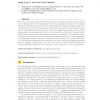Free Online Productivity Tools
i2Speak
i2Symbol
i2OCR
iTex2Img
iWeb2Print
iWeb2Shot
i2Type
iPdf2Split
iPdf2Merge
i2Bopomofo
i2Arabic
i2Style
i2Image
i2PDF
iLatex2Rtf
Sci2ools
CALCO
2015
Springer
2015
Springer
Revisiting the Institutional Approach to Herbrand's Theorem
More than a decade has passed since Herbrand’s theorem was first generalized to arbitrary institutions, enabling in this way the development of the logic-programming paradigm over formalisms beyond the conventional framework of relational first-order logic. Despite the mild assumptions of the original theory, recent developments have shown that the institution-based approach cannot capture constructions that arise when service-oriented computing is presented as a form of logic programming, thus prompting the need for a new perspective on Herbrand’s theorem founded instead upon a concept of generalized substitution system. In this paper, we formalize the connection between the institution- and the substitution-system-based approach to logic programming by investigating a number of features of institutions, like the existence of a quantification space or of representable substitutions, under which they give rise to suitable generalized substitution systems. Building on these resu...
| Added | 17 Apr 2016 |
| Updated | 17 Apr 2016 |
| Type | Journal |
| Year | 2015 |
| Where | CALCO |
| Authors | Ionut Tutu, José Luiz Fiadeiro |
Comments (0)

